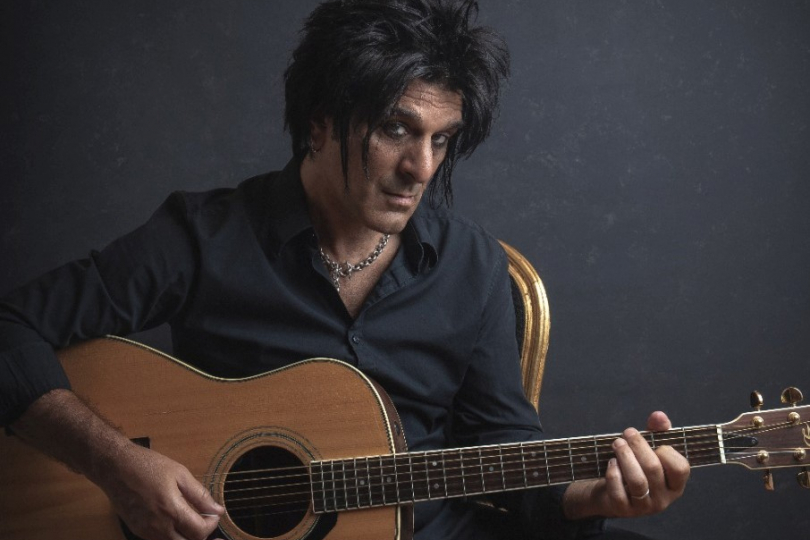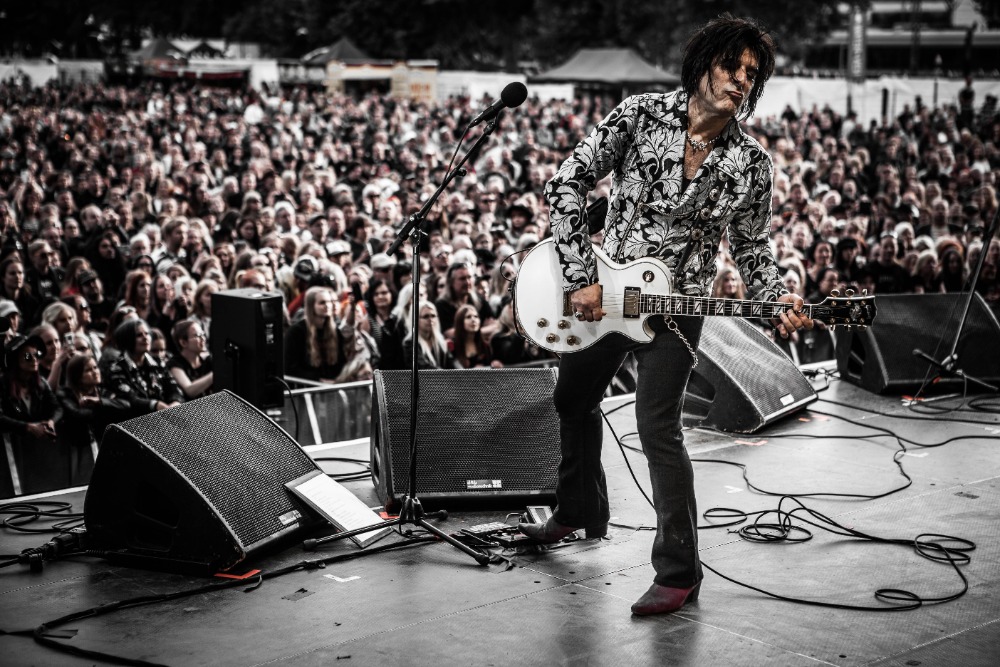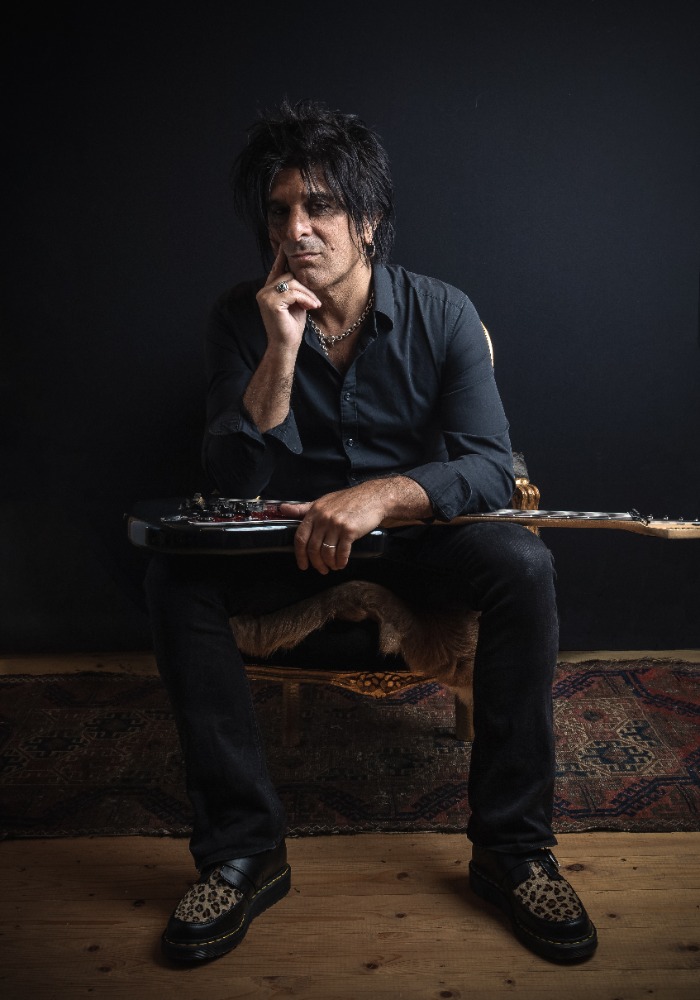
Steve Conte: When They Showed Me How To Play "Johnny B. Goode", the Whole World Opened up for Me
Steve Conte is an experienced guitarist whose work spans a variety of musical genres from rock'n'roll, blues and country, through funk and soul to punk rock. In addition to his extensive solo work, he has collaborated with many diverse musicians. For example, he has performed with Willy DeVille, and has even guested on an album by Czech musician Jirka Mucha. In 2004, he was offered by David Johansen to join the legendary punk pioneers New York Dolls, with whom he eventually played for six years and recorded two albums. Since 2010 he has been a part of Michael Monroe's band. The release of their new album I Live Too Fast To Die Young provided the perfect opportunity to discuss Steve's interesting musical journey.
You just released another album with Michael Monroe. The last two years have not been easy for musicians because of the covid. What was the writing and recording process of I Live Too Fast To Die Young like? Was it different in any way compared to previous albums?
Yes, it was very different. We weren't in the same room together during the recording, unlike with the previous albums One Man Gang and Blackout States. Since everything was closed from 2020 until 2021, we didn't get together until August 2021 to record some demos. Until then, we only had demos that we got at home.
It was a different way of working. You don't have the energy of the rest of the band and you're basically just sending what's in your head to the others. They either like the ideas right away or they don't. Most of the time it's Michael and Sami who approve whether the songs are right for the band or not.
I was doing acoustic ballads, political stuff, and we ended up actually with the stuff we usually do, which is kind of our pop-punk rock. It was all our individual visions that haven't changed much, like the song I wrote called "Pagan Prayer", which starts with a bassline. We were playing a song called "Love Song" by The Damned and I thought it would be cool to write a song with a similar structure, so I came up with this crazy bass line and Sami played it exactly like that. His hand almost died from it, but he did it. (laughs)
You have mentioned that you also worked on a solo album Bronx Cheer, which I think you managed to finish before the pandemic?
Not exactly. I had songs written, a lot of tracks recorded, and some overdubs done in 2020, so I was able to finish everything just before the pandemic. But I spent the rest of the summer mixing and mastering.
When the pandemic hit, my family and I left New York. It was crazy there, people were raiding supermarkets, buying up toilet paper, the shelves were empty, so I said screw it, let's go back to Europe where my wife is from. Our two boys and us spent the time in the Netherlands with her family.
So I mixed the album remotely. The guy who was in charge of the mix was in Los Angeles, and I was near Amsterdam. The time difference between us was about nine hours. So we always had a little window of time where I was getting ready for bed and he was just getting up. He'd send me mixed versions, I'd listen to them, make my notes, then we'd FaceTime and talk about it. We'd turn something up or down, change some effect and stuff like that. That took us all summer. My mind was more immersed in my solo record than in writing songs for the new Michael Monroe album.
When recording your own album, you're the mastermind. What say do you have with Michael? Can you decide what you do and don't like?
Oh yeah, especially when I or Rich are the songwriters, we would say, "Slower here, faster here, more aggressive here." Just whatever, we say these things to each other because, as I mentioned, the songs are our own vision. The main difference between making my own record and making an album with Michael is that with my records I always go for the band live, my rhythm guitar, bass and drums, everything must be live. The Monroe band doesn't have to favour an organic sound, it's more about power.
For me, it's about live, what's happening at the moment, having that real feel there, but feeling free to make mistakes. When you're recording live, there are going to be mistakes and I like it when it's a bit dirty.
You and Michael have just played your first concerts from the tour in Finland, Germany and Denmark. How did they go? Did you feel any particularly positive vibes from the audience? Can you tell that people were hungry for music and live shows and now they can finally enjoy them?
Absolutely. Everybody's excited about it. We still have to be vigilant not to get covid, even though most of the band has been through it. The last time we toured Finland, about two months ago, Sami and I got covid and had to cancel half the tour. We know that if anyone in the band gets sick, it will jeopardize the whole tour. So we're trying to be careful.
But when I'm on stage and I look out into the audience, people go crazy, they love it. We've played at the Rock Hard festival, for example, which is more of a metal fest. And now we were there, a glam-punk thing between mostly black metal and power metal bands, but people were digging it.
Same with the Alice Cooper audience we supported. Although his fans already know us because we used to play with him. It was cool when they pulled me and Michael out to play "School's Out" with them. I'm friends with Ryan, Chuck and Tommy from Alice's band. It was a blast.
What was it like getting up on stage after a long hiatus? Were you maybe more nervous than usual?
I wouldn't say more nervous, but never in my life I've not played live concerts for two years. Sure, I've played a few shows in the last two years, but they were different events, smaller gigs, acoustic or outdoor shows. I haven't been on any tour with big shows. I haven't played that little since I was maybe 13, when I started playing school dance shows.
I had to prepare myself after all this time, stretch my hands, practice my singing, but also prepare myself mentally. We've actually been playing as a band now for twelve years and we've kind of connected and automatically know when and what to do. For example, we would have kicked our legs at the same time and stupid things like that. And now you're slowly remembering everything, "Yeah, yeah, this is where I did this." (laughs)
Just last month you played a small bar show with David Weiss, now you're playing stadiums with Alice Cooper and you're about to do shows with Guns N'Roses. I was wondering how you feel about playing small and big gigs. Because playing in a small club or bar for a handful of people can sometimes be even more challenging than playing on a big stage with a big crowd.
Concerts with David were right in my neighbourhood, so I would just throw my guitar in a case and walk there. (laughs) Anyway, I've always liked a challenge. When there are fifty people a few feet away from you in a club, you can tell when your playing isn't working. It's always a challenge and a learning experience. In a way, I like the smaller gigs better, at least musically. My buddy David and I will easily pull out songs we haven't even played together before. Someone will shout out the name of the song, we know maybe a verse, so we'll play around with it a little bit. Just no pressure.
When the Monroe's band plays with Alice, for example, we have a 40-minute set. You have two songs left, but then it's time to leave the stage, so you have to skip one. That's not gonna happen in a small gig. Of course, I also like big events and everything that goes with it: big stage, big sound, big audience.
But at a small gig you have freedom, you can try different things and there's no risk of 20,000 fans filming you on their mobile phones when you mess up. If you play for a handful of people, the chances that a video will appear on YouTube the next day are slim. (laughs)

They say that by the time you were seventeen you had mastered the electric guitar, so you became interested in jazz, which you started studying. What brought you to jazz?
I was originally a drummer, but I've always liked good guitar players. I started playing the drums when I was seven because I heard Ringo. I took drum lessons until I was about thirteen. But by the time I was about eleven, I picked up my brother's guitar and realized I could write songs. I figured if I can write songs and sing, then I have to be in the front, I can't be the drummer sitting in the back. I started taking guitar lessons and got better pretty quickly. "Okay, this is my place, not behind the drums," I realized.
I learned from books for a while, which was horrible and boring. The moment I started learning myself, or rather, when a guy showed me how to play Chuck Berry's Johnny B. Goode, a whole world opened up for me. Somewhere around 15, I was learning stuff from Jimmy Page, Jimi Hendrix, Steve Howe from Yes, Jeff Beck. At seventeen, I heard the Mahavishnu Orchestra, John McLaughlin, Larry Carlton, Larry Corryell and other jazz fusion guys. They were doing stuff that was way beyond people like Richie Blackmore and stuff like that, which I already loved. I wanted to see what it was all about. I started listening to records and trying to learn from them.
At nineteen I was overdoing it with different substances. One morning I woke up, somewhere in a college dorm, blood dripping from my nose and I thought: "Oh my God, where am I? I'm alive. This is a sign from God." I had to get my life in order, I started studying music and stopped messing around with drugs. I started taking lessons with a jazz teacher and never looked back. I've been a better, sober person ever since. (laughs) I don't try to kill myself anymore.
The musical side of jazz certainly fascinates you. What is it like with punk rock or garage music?
I love its energy and the live shows. I'm not going to make it as a jazz musician because being in the jazz world requires total focus and dedication to the style. If you don't play it every day, work on it every day, you get lost. I'll play it at home occasionally, I'll use some guitar licks in rock and roll from time to time, but generally nobody would know I could do it if they didn't read this interview with me, for example. They're like, "Yeah, he's a punk rock dude, he's played with the New York Dolls and now Michael Monroe."
You come from a musical family, your brother John Conte plays, your parents...
Yeah, my brother's a great bass player. He played with Ian Hunter and Soca Johnny. My mom's still a jazz singer. She's more or less retired now, but she's still practising her voice. We released her album on my label a couple of years ago. She taught me how to sing. She started singing to me when I was still in her belly. She sang all the time, and I grew up hearing it.
So you had music playing all day long.
Yeah. My earliest memories are of all the classics like Beethoven, Bach, Haydn and Tchaikovsky. And then jazz, I remember hearing Ella Fitzgerald when I was about five, Miles Davis, Frank Sinatra, Tony Bennett, that sort of thing. At six I heard the Beatles, and that was it. That's what I want, guitars, drums and screaming. (laughs) "Twist And Shout", that was something.
Speaking of guitarists who have influenced you, there's a track on Bronx Cheer called "My Degeneration", which for me has a similar vibe to the Stones' Some Girls album. How much did the Stones influence you, and which period of theirs influenced you the most?
The Stones were a big influence on me. I love the albums with all the guitarists, Jones, Taylor and Wood. My favourite record is Let It Bleed, which is mainly Keith. Brian was out and is only on one track I think, and on acoustic guitar. All the solos and rhythm guitars were recorded by Keith. Mick Taylor wasn't in the band yet.
But I also like the records with Brian, Beggars Banquet, Aftermath, the period when Taylor joined and did Sticky Fingers, Black'n'Blue and Some Girls with Ronnie. Tattoo You is probably my least favourite. When I listen to my album, it really sounds like the Stones in the late seventies/early eighties when they were responding to punk but still keeping their blues roots.

If you have found an error or typo in the article, please let us know by e-mail info@insounder.org.

